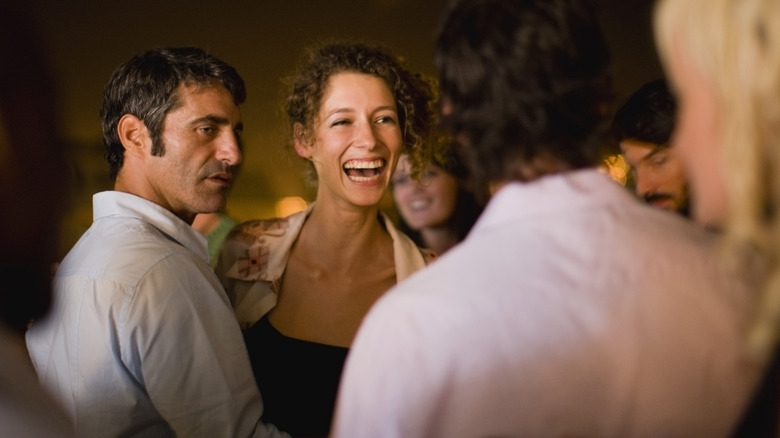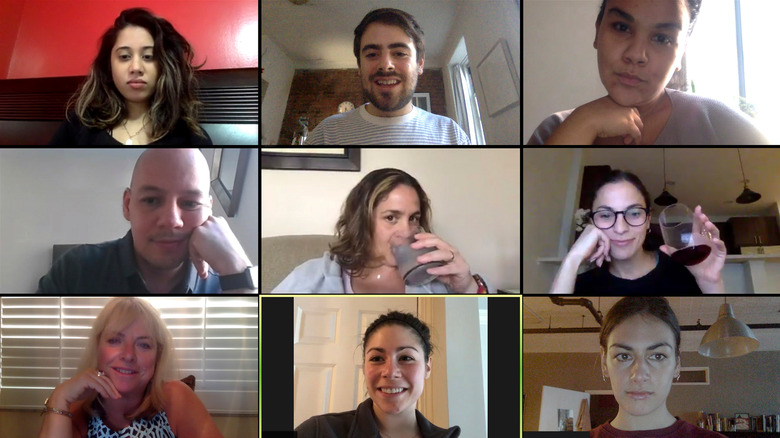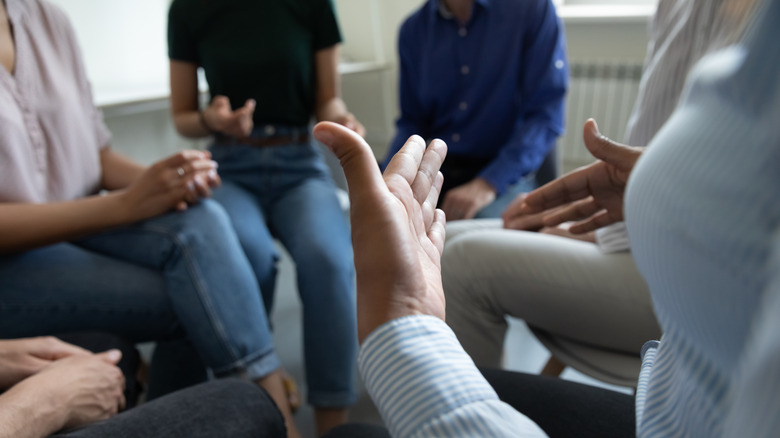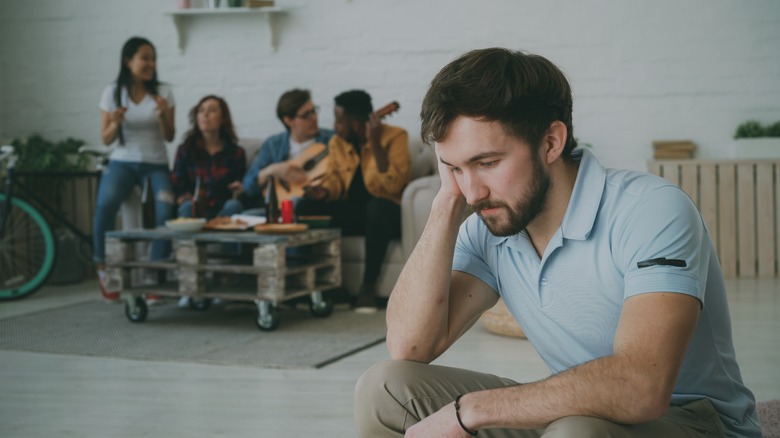
Zero Creatives/Getty Images
We've all been there: You roll into a party or bar, maybe meet some friends, those friends introduce you to some other friend, and ... no thank you. Something about that friend-of-a-friend is off, not cool, rubs you the wrong way, etc. You instinctively know right from the get-go whether or not you and this person will get along. By the second or third interchange in the first conversation, you very clearly see one of two paths: a) a wilted, abruptly cut-off bye-bye and we shall never speak again, or b) this is fantastic, and you can't wait to reconnect at some point in the future. But where does that intuition come from? Is it even accurate? And beyond such initial meetings, what drives human feelings of like and dislike of others we experience on a daily basis, like towards a co-worker, supervisor, or cashier? And is there any point where you can't get over your gut-level, bone-deep dislike of someone?
Have no fear because all such questions have actual answers. And not loosie-goosy, self-help listicle-type answers, either. But hard and data-driven conclusions built on actual research. Human behavior, cognitions, and emotions can be measured and tracked like anything else. It falls to the discipline of psychology to hold up the mirror to ourselves and answer the ever-present question, "Why?" In a nutshell, as Psych Mechanics states, much of our inherent, intuitive feelings of like or dislike are driven by two things: Unconscious biases and the specters of personalities past.
Outgroup bias: preference for the familiar

Cabeca de Marmore/Shutterstock
When moving forward in this list, be prepared to do a whole lot of facepalming. Practically every reason for liking and/or disliking someone reveals precisely how basic, atavistic, and so, so easily psychologically duped — especially by ourselves — we human animals are. Just imagine a small band of apes scrounging for food in the woods, perking up their ears at a sound, and the leader ape pointing at the sight of another unknown ape in the distance and crying, "Look! Friend? Foe? Kill? Hug?" And then maybe the leader ape puts on the "Hat of Woe" (a big leaf) and begins riling up the troops via the old chant-and-stomp. If you imagine this, then humanity and all its bizarre, contractionary behavior will come into a much clearer light, particularly how we separate foes from friends.
Case in point: outgroup bias. If you want to understand outgroup bias, just re-read the ancestral tale in the previous paragraph. As Practical Psychology describes, we see outgroup biases at work every time people like others who are familiar and dislike those who are unfamiliar. Outgroup bias is probably humanity's oldest and most blatantly tribal tendency, one meant to keep us safe from physical harm in the natural world but which botches modern civil discourse. Same sports team, same nationality, same skin color, same college major, same video game console, same cigarette brand: these are the safe folks who make similarly-shaped folks think, "Hey, I like this one!"
Projection: you're like me and I don't like me

fizkes/Shutterstock
Let's use a fictional guy at work named Cody to illustrate another reason why people like and/or dislike others. Cody is loud in the lunch area, never stops talking about "my girlfriend," is really into cliff diving and loves showing you pictures of that one time he cliff dove in Mexico ("See, it looks just like Monaco!"), and works as an unpaid advocate for his favorite brand of protein powder, which he often holds up to his phone as a selfie partner. One day you're in the lunchroom silently grousing to yourself about how annoying Cody is, and you turn to a co-worker and loudly say, "So my girlfriend and I are heading to Costa Rica in July. Yeah, I know! It's so nice. Look, here's when we cliff-dove in the Dominican Republic last year." Boom: Cue the epiphany that you hate Cody because he represents all those things that you dislike about you. And maybe, just maybe, Cody gets away with it better than you.
That little vignette, in a nutshell, demonstrates what psychologists call projection. As Psychology Today describes, projection is a way of blaming someone else for one's own faults and foibles rather than taking care of them in oneself. It's not you who's possessive, in other words, it's your partner who's possessive — you're perfect and blameless. Projection is a powerful defense mechanism and unconscious impulse, first defined in psychological terms by Sigmund Freud.
Attribution bias: misreading causes of actions

Studio Romantic/Shutterstock
There's another no-brainer reason you might dislike someone: you might be wrong. That's a shocking and blasphemous statement, we know. But let's be honest — people are often garbage at understanding other people's feelings, the causes for their actions, and the intentions behind their words and choices. Moreover, people aren't just bad at figuring out what they're not told explicitly, they often disregard what they are told explicitly and even claim that it's not true in order to avoid feeling uncomfortable at being wrong. It's really quite sad. And out of all the reasons why someone might be reading someone else wrongly, attribution bias stands head and shoulders above the rest.
Simply put, attribution bias — true to its name — involves attributing incorrect causes to someone's actions, as Be Applied explains. Let's say you're standing in line for a coffee, and someone brusquely cuts through the line to get to the door faster. You and others might categorically conclude, based on that one action, "Oh, that person did that because she's a jerk. I don't like her. Simple." Or let's say you meet someone for the first time, and they appear distant or uninvolved, and you think, "Oh, he's an arrogant schmuck. I don't like him. Simple." Those judgments, however, may be way off-base. Maybe the first person had a medical condition and was in a hurry. Maybe the second person's dog died yesterday. Situational reasons may be to blame and not someone's innate character.
Mirroring: not doing what you're not doing

silverkblackstock/Shutterstock
So you know how a baby smiles if you smile first? That's called mirroring, per Psych Central, and it's one of the most fundamental ways that social animals like humans develop the core traits necessary for existing in society, like reading when someone else is sad, angry, happy, etc. It's also, in the midst of the parent-child bond, critical to personality development. Was one's early life caregiver present or absent? Did one's caregiver give willingly or unwillingly? Were resources like food and affection available or withheld?
The answers to such questions define adults' relationships, behavioral patterns, and formulate feelings of wariness, affability, the need for comfort, and on forth. This line of inquiry is referred to as Attachment Theory, per Very Well Mind. If someone's early childhood development was less than ideal, then that person might misread others as an adult. They might conclude that they don't like persons x, y, or z because those people represent some facet of an unhealthy early childhood attachment style, or even a traumatic event, as Psych Mechanics overviews.
Further to the point: Adults mirror others just like smiling babies. It might be the case that if someone comes across as unlikeable and isn't smiling, engaged, or pleasant, that person could be giving back to you what you're putting out. In the exact same way, people who come across as likable may appear as such because they're mirroring your geniality and openness, as Forbes explains.
Non-verbals: communication without words

Ground Picture/Shutterstock
This is by no means an exhaustive list of reasons why people dislike other people. Aside from the scant few, but pertinent, reasons outlined in this article, practically any and all cognitive biases can affect interpersonal relationships, like those outlined in The Decision Lab. That's not to say that every instinct or sentiment is always completely wrong or the result of bungled human perception. It may very well be the case that "vibes" or some such feelings are wholly accurate. And if you dislike someone, then ok. But it's important to understand why, because understanding why could mean the difference between an unfair judgment or not or knowing oneself or not.
That being said, we already touched on a final reason why people might dislike others: non-verbal communication. People are always emoting even if they don't realize it: crossing one's arms, facing a certain direction, tilting the head, maintaining eye contact, standing near or far to someone else, etc., as Forbes outlines. In the end, such gestures create in others an overall impression of comfort ("I like this person") or discomfort ("I don't like this person") regardless of conversation or any actual information about a person. Some individuals, like those used to public speaking, are great at recognizing and controlling these gestures, which remain largely unconscious. But thankfully, those who aren't so adept can learn. And like the other items on this list, awareness is the first step to taking care of oneself and one's relationships.